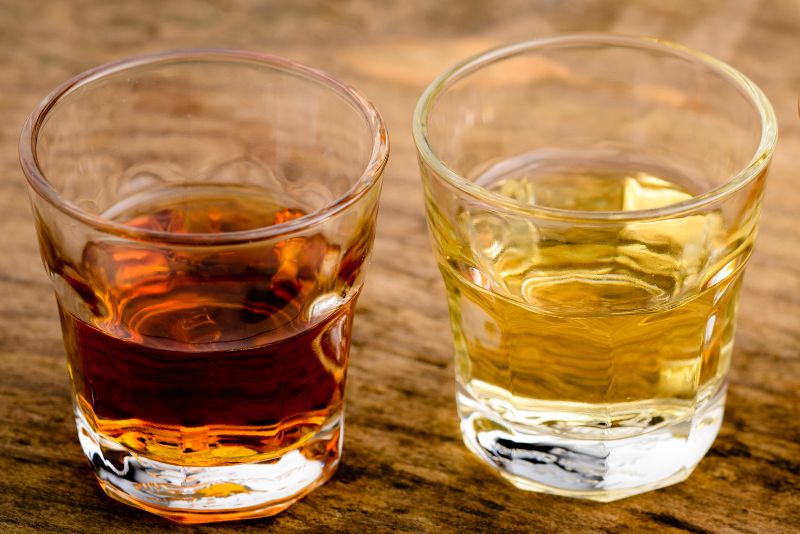Cooking with wine can definitely add to the dish, but for someone who is not familiar with cooking with wine might look at the options (or the recipe) and feel particularly overwhelmed. Especially when it comes to two wines that are so familiar, like marsala and sherry.
In this article, we’re really going to dive into marsala vs sherry- what the differences between the two are so you can make a better-educated decision when it comes to cooking your next meal!
Table of Contents
What is Marsala?
Marsala is a wine that is made on the island of Sicily, Italy near the town of Marsala, where it gets its name. Marsala as a cooking wine is typically a dry or semi-dry cookie wine best known to be included in the dish Chicken Marsala.
What is Sherry?
Sherry on the other hand is a wine that is made near the city of Jerez de la Frontera. Interestingly enough it is also a Spanish law that all Sherry must come from the Sherry Triangle.
The Sherry Triangle is comprised of 3 cities. Jerez de la Frontera, El Puerto de Santa Marie, and Sanlucar De Barrameda. While this is, as stated, a Spanish Law. Sherry is also made in other countries like Canada, Australia, and South Africa.
Marsala vs Sherry: What’s the Difference?
The one thing Marsala and Sherry have in common is the fact that they are both considered ‘Fortified’ wines. Fortified wines are wines that are mixed with brandy. Otherwise, Marsala and Sherry are both very different.
Differences in Grapes
One of the first ways they are different is the fact that they are made with completely different grapes. Marsala, which is as we discussed derived from Sicily, Italy, is made from grapes native to the area of Sicily including Inzolia, Damaschino, Grillo, and Catarratto.
Sherry on the other hand is made from Moscatel, Pedro Ximenez, and Palamino grapes. As a matter of fact, 90 % of the wine is made with Palamino grapes alone.
Processing Differences
Both wines have different processes in creation as well. Marsala can be made in different ways depending on if the producer wants a sweeter wine, or perhaps a drier one.
First, the grapes are harvested and crushed, then they will fortify (add brandy) the mixture. Typically, if the winemaker fortifies the wine before fermentation is complete there will be residual sugar.
This sugar will make for a sweeter wine. If the winemaker chooses to add the spirits (like brandy) after the fermentation has completed then there will be a low sugar content making for a drier wine.
The process for making Sherry on the other hand is a bit more complex. First, the grapes are pressed lightly to extract what is called the must. Must is what the mixture is called after pressing that includes the skins, stems, etc of the fruit.
This must is used to produce two different types of Sherry called Fino and Manzanilla. Once the must is pressed a second time, Oloroso will be produced.
If there are any additional pressings, things such as Vinegar, distillation, or any lesser wines are the result. Must is typically fermented in vats. Afterward, Sherry must be stored in casks for aging. The shortest period of time a Sherry is aged is 2 years but some Sherries are aged for 20 years or more.
Frequently Asked Questions
Can you use Marsala and Sherry in cocktails?
Definitely yes! One such cocktail is called a Sherry Cobbler. The ingredients for this include:
- 1 orange half-wheel (optional but I definitely like it)
- 1 orange wheel (for your garnish)
- ¼ ounce of simple syrup
- 3 oz dry amontillado sherry
First, fill a shaker with ice and add simple syrup, an orange half-wheel, and your sherry.
Then, shake it roughly and strain it into a glass filled with crushed ice.
Garnish your drink with your orange wheel (optional) and you’re done!
My favorite marsala cocktail is called a Jentz Cocktail. The ingredients include:
- 2 Parts of Colombo Marsala (Sweet)
- 1 Part Gin
- 1/4th cup of pink grapefruit juice.
Simply mix and sever with an orange slice.
This is only one way you can do the Jentz cocktail but I find that it’s a pretty versatile cocktail and I suggest playing around with some different juices to get a feel of what tastes best to you.
I also like to include pineapple juice (one of my favorite juices) since sometimes grapefruit juice is a little too tart for me in general. It all just depends on your tastes.
Either of these wines you can always just play around with them and figure out what tastes best to you. Who knows you could just create some new drink that’s just amazing!
Is dry Marsala similar to dry Sherry?
This is a yes and no question…somewhat. It all depends on the taste. Whatever you substitute with is going to make things taste different than what you would have originally put in but in a nutshell, yes.
It is similar and a go-to substitute if you either don’t like marsala or just don’t have it on hand. To me, however, dry sherry just is not as flavorful as Marsala wine.
Though of course, that’s just my opinion as I prefer things that are on the sweeter side. You might just find something that really tastes good if you experiment a little.
Conclusion
It doesn’t really matter which you prefer. Either one you use will definitely take your recipe to the next level. And though there are definite differences but no matter their differences, they are both great wines to use in the kitchen.
